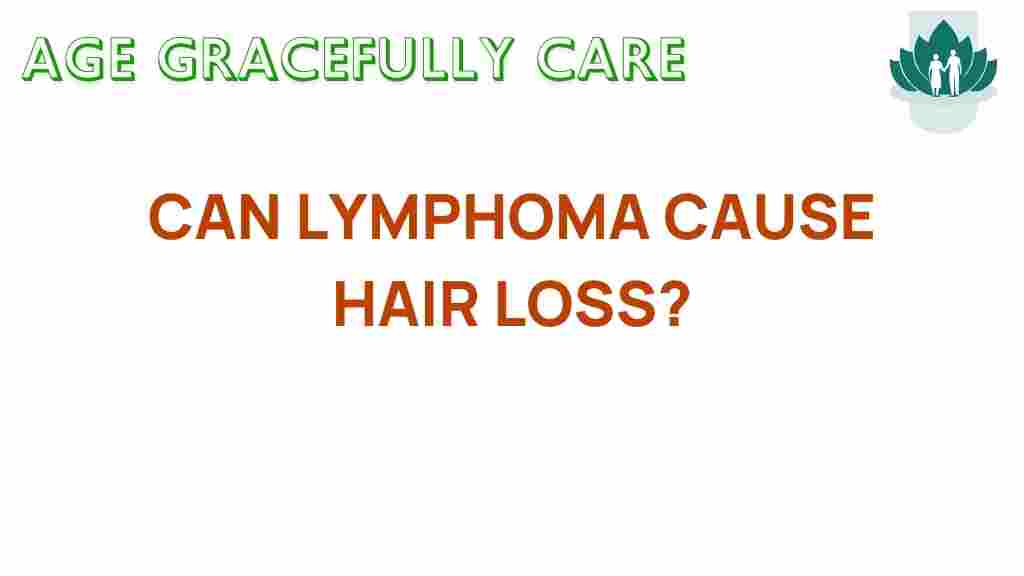Unraveling the Mystery: Can Lymphoma Cause Hair Loss?
Lymphoma is a type of cancer that affects the lymphatic system, which is part of the immune system. One of the most common concerns for patients diagnosed with lymphoma is hair loss. In this article, we will explore the relationship between lymphoma and hair loss, examining the cancer symptoms, treatment effects, health concerns, and patient experiences. By the end, you will have a comprehensive understanding of how lymphoma can impact hair health and what patients can expect throughout their journey.
Understanding Lymphoma
Lymphoma is primarily categorized into two main types: Hodgkin lymphoma and non-Hodgkin lymphoma. Both types originate in lymphocytes, a type of white blood cell crucial for the immune response. Symptoms of lymphoma can vary, but they often include:
- Swollen lymph nodes
- Fever
- Night sweats
- Weight loss
- Fatigue
While these symptoms are alarming, they do not directly indicate hair loss. However, the treatments for lymphoma, particularly chemotherapy, can lead to significant changes in a patient’s physical appearance, including hair loss.
How Chemotherapy Affects Hair Loss
Chemotherapy is a common treatment for lymphoma and involves using powerful drugs to kill cancer cells. Unfortunately, these drugs can also affect healthy cells, especially those that divide rapidly, such as hair follicles. Here’s how chemotherapy can lead to hair loss:
- Types of Chemotherapy Drugs: Certain chemotherapy regimens are more likely to cause hair loss than others. Drugs like doxorubicin, cyclophosphamide, and vincristine are known to have this side effect.
- Hair Loss Timing: Hair loss can occur anywhere from a few days to several weeks after starting chemotherapy. Some patients may experience thinning hair, while others may lose all their hair.
- Temporary vs. Permanent Loss: In most cases, hair loss due to chemotherapy is temporary. Hair usually begins to regrow a few weeks after treatment ends, although it may initially have a different texture or color.
Patient Experiences with Hair Loss
Patient experiences regarding hair loss can vary widely. Some may feel devastated by the change in appearance, while others may find it a small sacrifice in the fight against cancer. Here are some common sentiments shared by patients:
- Emotional Impact: Many patients report feelings of sadness or loss of identity when experiencing hair loss. It can be a constant reminder of their illness.
- Support Systems: Patients often benefit from support groups where they can share their experiences and coping strategies.
- Alternative Solutions: Some individuals opt for wigs, scarves, or hats to manage their appearance during treatment.
Health Concerns Related to Hair Loss
While hair loss is primarily seen as a cosmetic issue, it can have broader health implications. Here are some health concerns associated with hair loss due to lymphoma treatments:
- Skin Sensitivity: Patients may experience increased sensitivity of the scalp and skin during treatment, making it essential to use gentle hair care products.
- Infection Risk: Hair follicles can become inflamed, which may increase the risk of infections.
- Psychological Effects: The emotional toll of hair loss can lead to anxiety and depression, affecting overall well-being.
Managing Hair Loss During Treatment
There are several ways to manage hair loss and its emotional effects during lymphoma treatment:
- Consult with a Dermatologist: A dermatologist can provide tailored advice on caring for your scalp and hair during treatment.
- Explore Options for Wigs and Hairpieces: Many organizations offer free or low-cost wigs for cancer patients.
- Join Support Groups: Connecting with others who are going through similar experiences can provide emotional support.
- Practice Self-Care: Engage in activities that promote relaxation and self-acceptance, such as yoga or meditation.
Alternative Treatments and Considerations
Some patients explore alternative treatments that may help minimize hair loss during chemotherapy. However, it is crucial to discuss these options with your oncologist. Some potential considerations include:
- Scalp Cooling: Scalp cooling systems may help reduce hair loss during chemotherapy by constricting blood vessels and reducing the amount of chemotherapy that reaches hair follicles.
- Nutritional Support: A well-balanced diet rich in vitamins and minerals can support overall health, including hair health.
- Herbal Remedies: Some patients explore herbal supplements, but it is essential to consult with healthcare professionals before trying these.
Conclusion: Embracing the Journey
While hair loss can be one of the more challenging side effects of lymphoma treatment, understanding the reasons behind it and taking proactive steps can help patients navigate this journey. Lymphoma itself does not directly cause hair loss, but the effects of treatment, particularly chemotherapy, can lead to significant changes in appearance.
It is vital for patients to communicate openly with their oncology team about any concerns they have regarding hair loss and other cancer symptoms. Support from family, friends, and fellow patients can also make a significant difference in coping with these changes.
For more information on managing hair loss during cancer treatment, visit Cancer.org. If you are looking for support, consider joining a local or online support group to connect with others who understand your experiences.
Remember, every patient’s experience is unique, and while hair loss can be a difficult aspect of lymphoma, it is just one part of the broader journey towards recovery and health.
This article is in the category Health and created by AgeGracefullyCare Team
